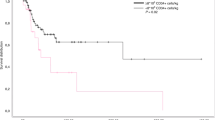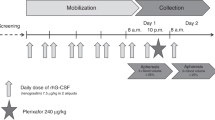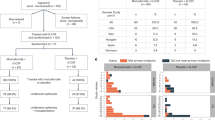Abstract
We have shown that large numbers of haemopoietic progenitor cells are mobilised into the blood after filgrastim [granulocyte colony-stimulating factor (G-CSF)] alone and filgrastim following cyclophosphamide chemotherapy in previously untreated patients with ovarian cancer. These cells may be used to provide safe and effective haemopoietic rescue following dose-intensive chemotherapy. Using filgrastim alone (10 micrograms kg-1), the apheresis harvest contained a median CFU-GM count of 45 x 10(4) kg-1 and 2 x 10(6) kg-1 CD34+ cells. Treatment with filgrastim (5 micrograms kg-1) following cyclophosphamide (3 g m-2) resulted in a harvest containing 66 x 10(4) kg-1 CFU-GM and 2.4 x 10(6) kg-1 CD34+ cells. There was no statistically significant difference between these two mobilising regimens. We have also demonstrated that dose-intensive carboplatin and cyclophosphamide chemotherapy can be delivered safely to patients with ovarian cancer when supported by peripheral blood progenitor cells and filgrastim. Carboplatin (AUC 7.5) and cyclophosphamide (900 mg m-2) given at 3 weekly intervals with progenitor cell and growth factor support was well tolerated in terms of haematological and systemic side-effects. Double the dose intensity of chemotherapy was delivered compared with our standard dose regimen when the treatment was given at 3 weekly intervals. Median dose intensity could be further escalated to 2.33 compared with our standard regimen by decreasing the interval between treatment cycles to 2 weeks. However, at this dose intensity less than a third of patients received their planned treatment on time. All the delays were due to thrombocytopenia.
This is a preview of subscription content, access via your institution
Access options
Subscribe to this journal
Receive 24 print issues and online access
$259.00 per year
only $10.79 per issue
Buy this article
- Purchase on Springer Link
- Instant access to full article PDF
Prices may be subject to local taxes which are calculated during checkout
Similar content being viewed by others
Author information
Authors and Affiliations
Rights and permissions
About this article
Cite this article
Weaver, A., Wrigley, E., Watson, A. et al. A study of ovarian cancer patients treated with dose-intensive chemotherapy supported with peripheral blood progenitor cells mobilised by filgrastim and cyclophosphamide. Br J Cancer 74, 1821–1827 (1996). https://doi.org/10.1038/bjc.1996.637
Issue Date:
DOI: https://doi.org/10.1038/bjc.1996.637
This article is cited by
-
Analysis of remobilization success in patients undergoing autologous stem cell transplants who fail an initial mobilization: risk factors, cytokine use and cost
Bone Marrow Transplantation (2004)
-
High-dose ifosfamide and etoposide with filgrastim for stem cell mobilization in patients with advanced ovarian cancer
Bone Marrow Transplantation (2000)



